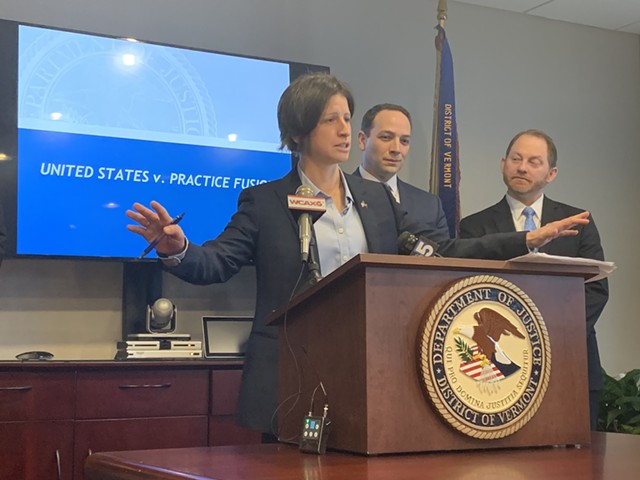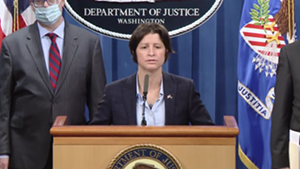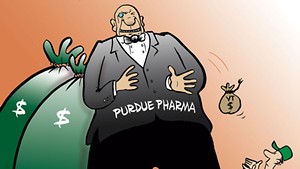
- Derek Brouwer
- U.S. Attorney Christina Nolan at a Monday press conference
Updated 8:07 p.m.
Purdue Pharma, the infamous drugmaker behind OxyContin, is an unnamed co-conspirator in a criminal probe that was revealed Monday by federal prosecutors in Vermont,
Seven Days has learned.
Christina Nolan, the U.S. Attorney for the District of Vermont, announced a $145 million settlement with electronic medical records company Practice Fusion over criminal charges that it conspired with an unnamed opioid manufacturer in 2016 to subtly push the addictive pills via doctors.
Nolan refused to identify the drug company, identified in court filings as "Pharma Co. X," because the company had not been indicted.
Seven Days verified that Pharma Co. X is Purdue by comparing documents referenced in the court filings with others that identify the program between Stamford, Conn.-based Purdue and Practice Fusion.
The U.S. Attorney's Office declined to comment. Purdue said in a statement that the company has previously noted it is cooperating with federal investigators and "is engaged in ongoing discussions with the DOJ regarding a potential resolution of these investigations and therefore the company has no comment at this time.”
The filing sheds new light on how Purdue found ways to increase OxyContin prescriptions even as company's opioid empire was beginning to collapse.
The conspiracy allowed “the drug company to have its thumb on the scale at precisely the moment a doctor was making incredibly intimate, personal, and important decisions about a patient’s medical care," Nolan said in a Monday press release announcing the Practice Fusion settlement.
The case thrusts Vermont's federal prosecutors into the complex, high-stakes negotiations over how Purdue should be held accountable for its central role in fueling a nationwide opioid-abuse epidemic. Nolan said her investigators uncovered the kickback scheme.
Purdue filed for bankruptcy in September 2019 as part of a $10 billion tentative agreement with more than 20 states that have sued the company for the way it aggressively marketed OxyContin.
The federal government has declined to confirm a criminal probe involving Purdue. But in bankruptcy filings last October, the company revealed that its massive civil settlement with state attorneys general is contingent upon settling a series of civil and criminal inquiries with the U.S. Department of Justice.
Citing anonymous sources, the
Wall Street Journal reported last fall that Purdue was working to resolve civil and criminal probes by three regional DOJ offices, including Vermont.
As part of its agreement with Nolan's office, Practice Fusion agreed to cooperate with prosecutors in ongoing or future investigations. It also admitted to more than 20 pages of facts outlined in court documents.
Practice Fusion created medical records software that was used by thousands of doctors in all 50 states. Its main selling point was that the software was free to its users. To make money, Practice Fusion sold advertising on the platform.
Sponsored alerts prompted doctors with treatment suggestions based on information in a patient’s file. For instance, the company signed a deal with Merck to let doctors know when a patient was due for vaccines.
Former Practice Fusion CEO Ryan Howard
told the Journal in 2015 that the platform could foster public health benefits, in part by identifying doctors who frequently prescribe often-abused drugs such as OxyContin.
But behind the scenes, Purdue's marketing department and Practice Fusion's team were exploring quite the opposite, court filings show: How the alert system could boost Purdue's opioid sales. Purdue paid nearly $1 million to sponsor a "pain-care" alert, which prodded doctors to ask patients about their pain and suggested a menu of treatment options.
It listed extended-release opioids — of which OxyContin was a leading brand — as an option for patients with moderate pain, and without regard to whether their symptoms could be treated in other ways, contrary to federal medical guidelines and the Food and Drug Administration-approved label for OxyContin.
Purdue's motivation, prosecutors contended, was to increase prescriptions.
Among numerous internal emails from both companies cited in the filings is an exchange in early 2014 between a Pharma Co. X employee and its CEO about the budding idea.
“I know you know of Practice Fusion, we too are working to get our pain management tools into their platform," the employee wrote.
“Thanks. The key is understanding how it grows or protects scripts,” the CEO replied.
Purdue's CEO at the time was Mark Timney, though filings do not identify email participants by name.
The illegal kickback scheme worked, prosecutors said. More than 230 million of the Purdue-sponsored alerts went out to doctors between July 2016 and the spring of 2019. Health care providers who received them prescribed extended-release opioids at a higher rate than those that did not, they said.
Allscripts bought Practice Fusion for $100 million in 2018. It had earlier valued the company at $250 million,
according to reports, but became aware of what was initially a civil probe into the company by the DOJ.
Vermont Attorney General T.J. Donovan has declined to participate in the proposed civil settlement with Purdue that is separate from the DOJ's work, saying it doesn't do enough. The state's lawsuit against the company and its billionaire owners, the Sackler family, is paused while Purdue's bankruptcy case plays out.
Negotiations between Purdue and the DOJ, including Nolan's office, could reduce the funds available for state litigants in the civil cases, potentially derailing the settlement,
the Journal reported last year.
Federal prosecutors brought criminal charges against Purdue and some top executives in 2007, but settled them in exchange for more than $600 million in fines. The executives pleaded guilty to misdemeanor criminal charges and avoided jail time.
Critics have said the settlement failed to stanch the epidemic, which has killed tens of thousands of people annually in the years since.
Read the criminal charges against Practice Fusion and the deferred prosecution agreement below:
















Comments (5)
Showing 1-5 of 5
Comments are closed.
From 2014-2020, Seven Days allowed readers to comment on all stories posted on our website. While we've appreciated the suggestions and insights, right now Seven Days is prioritizing our core mission — producing high-quality, responsible local journalism — over moderating online debates between readers.
To criticize, correct or praise our reporting, please send us a letter to the editor or send us a tip. We’ll check it out and report the results.
Online comments may return when we have better tech tools for managing them. Thanks for reading.